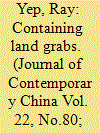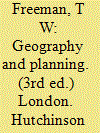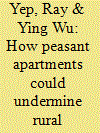| Srl | Item |
| 1 |
ID:
123964


|
|
|
|
|
| Publication |
2013.
|
| Summary/Abstract |
To a certain extent, a more stringent regime for requisition of rural land may help protect the interests of peasants. There is, however, a hierarchy of income opportunity in the countryside as a result of diversification of rural economic structure in reform China. The varying degree of land dependence renders a contrasting calculation on the value of land lease among Chinese peasants. For peasants in the more prosperous regions, the conflicts are primarily triggered by their exclusion from direct engagement in the land market and deprivation of the chance to maximise potential gain that fuels the growing tension in the countryside. A more direct response to this fundamental cause, however, requires audacious moves by the Party leadership venturing into zones of political taboo.
|
|
|
|
|
|
|
|
|
|
|
|
|
|
|
|
| 2 |
ID:
024071


|
|
|
|
|
| Edition |
3rd ed.
|
| Publication |
London, Hutchinson University Library, 1967.
|
| Description |
192p.Pbk
|
| Contents |
Includes Index.
|
|
|
|
|
|
|
|
|
|
|
|
Copies: C:1/I:0,R:0,Q:0
Circulation
| Accession# | Call# | Current Location | Status | Policy | Location |
| 002336 | 910.1711/FRE 002336 | Main | On Shelf | General | |
|
|
|
|
| 3 |
ID:
173853


|
|
|
|
|
| Summary/Abstract |
A seismic change in the residential pattern is emerging in rural China today: traditional rural houses have been rapidly erased from the face of the countryside with large numbers of peasants being relocated to modern high-rise buildings. This process of “peasant elevation” has had a monumental impact on rural China. It redefines the entitlement to land use by the rural citizenry and negotiations for a new regime of property rights concerning land administration, while, most importantly, it undermines the position of the local state in rural China, whose authority is an aggregation of three distinctive elements: coercive power inherent in the state apparatus, control over economic resources, and resonance with local morality. Based on original data collected in Chongqing, Nantong and Dezhou, this paper argues that the comprehensive uprooting of the Chinese peasantry from the land and the resulting complications have caused moral disorientation among the relocated peasants and fragmentation of local authority. The difficulty in establishing community identity in the new setting has further undermined local governance. This may in turn trigger a wave of social and political tensions that may eventually turn out to be a major political challenge to the regime for years to come.
|
|
|
|
|
|
|
|
|
|
|
|
|
|
|
|